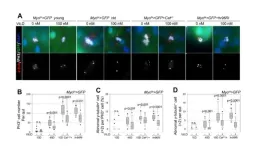(Press-News.org) BATON ROUGE – People with type 2 diabetes who underwent bariatric surgery achieved much better long-term blood glucose control compared to people who received medical management plus lifestyle interventions, according to a new study published in JAMA, or Journal of the American Medical Association, and funded by the National institute of Diabetes, Digestive and Kidney Diseases, part of The National Institutes of Health.
In addition, participants who underwent bariatric surgery, also called metabolic or weight-loss surgery, were more likely to stop needing diabetes medications and had higher rates of diabetes remission up to 12 years post-surgery. Pennington Biomedical’s Dr. John Kirwan and Dr. Philip Schauer were among the lead investigators for the 12-year study, titled “Alliance of Randomized Trials of Medicine vs Metabolic Surgery in Type2 Diabetes,” or ARMMS-T2D.
“This is the largest and longest running study of its kind, and provides the key insight that metabolic surgery provides better long-term remission of type 2 diabetes over standard management of the disease,” said Dr. Kirwan, MSc, PhD, Executive Director and the George A. Bray, Jr. Endowed Super Chair in Nutrition, Pennington Biomedical Research Center. “As Principal Investigator of this multicenter trial, I am so proud of the outstanding team effort that brought together scientists from Pennington Biomedical, Cleveland Clinic, Harvard, Pittsburgh and Seattle to collaborate and contribute to this milestone study.”
The study combined independent single-center randomized trial data from four centers in the U.S. – Cleveland Clinic, Joslin Diabetes Center/Brigham and Women’s Hospital, University of Pittsburgh, and University of Washington. The original trials, which were conducted between May 2007 and August 2013, evaluated the effectiveness of bariatric surgery compared to intensive lifestyle and medication therapy involving oral and injectable diabetes medications including insulin for adults with type 2 diabetes and overweight or obesity.
While some participants in the study were prescribed GLP-1 agonists as part of their medical management of diabetes, these drugs were not specifically examined in the study. The investigators from the four individual studies pooled their data to provide a larger and more geographically diverse data set to evaluate efficacy, durability, and safety of bariatric surgery to treat type 2 diabetes. Follow-up data were collected through July 2022.
In total, 262 participants from the four original studies enrolled in the current study. Of these, 166 were randomized to surgery and had undergone one of three common bariatric surgery procedures: sleeve gastrectomy, gastric bypass and gastric banding. The remaining 96 participants were randomized to the medical/lifestyle management group. Participants in the lifestyle interventions received treatments that have previously been shown to be effective for weight loss. All participants were between the ages 18 and 65 and had overweight or obesity as measured by body mass index, or BMI. Primary endpoint results were measured at seven years, with continued follow-up through 12 years.
At seven years, participants in the surgery group experienced an average 20 percent weight loss compared to 8 percent in the medical/lifestyle group. The surgery group had greater improvements in blood glucose control, measured by HbA1c, with 54 percent of participants in the surgery group achieving an HbA1c of less than 7 percent compared to only 27 percent of participants in the medical/lifestyle group. More participants with surgery achieved diabetes remission compared to participants the medication/lifestyle group, and the percent of participants using medications to treat diabetes in the surgery group decreased from 98 percent to 61 percent yet remained largely unchanged in the medication/lifestyle group.
The results and differences between groups remained significant at 12 years.
“We are pleased to have taken part in this landmark study, and these results further reinforce the confidence we have in metabolic surgery,” said Dr. Schauer, Director of the MetamorTM Metabolic Institute at Pennington Biomedical. Dr. Schauer, a metabolic surgeon, performed the surgery on these patients while at his former position at the Cleveland Clinic. “For patients with type 2 diabetes and obesity, who are at serious risk of heart attack, stroke, premature death, or diabetes complications, metabolic surgery, especially gastric bypass or sleeve gastrectomy, is safe, well established and an effective life changing option for many.”
Additional exploratory analyses in this study showed that bariatric surgery had important, beneficial effects on HbA1c and weight loss among participants with a BMI between 27 and 34 (within overweight and lower obesity ranges).
No differences in major adverse events occurred between the two groups, but there were more incidences of fracture, anemia, low iron, and gastrointestinal events in the surgery group. Nutritional deficiencies may explain fractures and anemia, underscoring the importance of vitamin supplementation and continued monitoring of people who have bariatric surgery.
Study participant Judge Parker, who exhibited the same diabetes and obesity present in his family history, underwent bariatric surgery in December 2008 by Dr. Schauer. Since the surgery, and with regular check-ups, he now weighs 195 pounds, dropping from 306 pounds prior to the surgery. Additionally, Parker is diabetes free, is not taking any diabetes medication and has an A1C level of 5.6 percent.
“The surgery was my lifesaver,” Parker said. “I was on diabetes medicines and insulin, but I mostly remember I had a hard time getting around, I got tired and simply didn’t feel good. Now, I’m rearing to go, over 100 pounds lighter and free of diabetes, sleep apnea and lower blood pressure.”
The study, known as the Alliance of Randomized Trials of Medicine vs. Metabolic Surgery in Type 2 Diabetes (ARMMS-T2D) is supported by cooperative agreement U01DK114156 from NIH National Institute of Diabetes and Digestive and Kidney Diseases, or NIDDK.
“Obesity and type 2 diabetes are complex conditions with many common risk factors and long-term complications,” said NIDDK Director Dr. Griffin P. Rodgers. “This study exemplifies how public investments in obesity and diabetes research can lead to real clinical advances and long-term health benefits for millions of Americans experiencing these conditions.”
The study represented a long-term collaboration of researchers from a variety of esteemed research centers and clinics, including Pennington Biomedical Research Center, the University of Pittsburgh’s Department of Surgery, the Joslin Diabetes Center’s research division, Harvard Medical School, the Department of Quantitative Health Sciences and the Department of Surgery at the Cleveland Clinic, Kaiser Permanente Washington Health Research Institute, Brigham and Women’s Hospital’s Division of Endocrinology and its Division of General & GI Surgery, Diabetes and Hypertension, the University of Kansas Medical Center’s Department of Internal Medicine, Division of Physical Activity and Weight Management, the Division of Endocrinology, Diabetes and Metabolism at Weill Cornell Medical Center, the Department of Medicine at the University of Washington and VA Puget South Health Care System.
About the Pennington Biomedical Research Center
The Pennington Biomedical Research Center is at the forefront of medical discovery as it relates to understanding the triggers of obesity, diabetes, cardiovascular disease, cancer and dementia. Pennington Biomedical has the vision to lead the world in promoting metabolic health and eliminating metabolic disease through scientific discoveries that create solutions from cells to society. The Center conducts basic, clinical, and population research, and is a campus of the LSU System.
The research enterprise at Pennington Biomedical includes over 480 employees within a network of 40 clinics and research laboratories, and 13 highly specialized core service facilities. Its scientists and physician/scientists are supported by research trainees, lab technicians, nurses, dietitians, and other support personnel. Pennington Biomedical a state-of-the-art research facility on a 222-acre campus in Baton Rouge.
For more information, see www.pbrc.edu.
END
Bariatric surgery provides long-term blood glucose control, type 2 diabetes remission
Pennington Biomedical Research Center’s Dr. John Kirwan and Dr. Philip Schauer among the key investigators for the 12-year study published in JAMA
2024-02-27
ELSE PRESS RELEASES FROM THIS DATE:
The anti-aging effect of vitamin D and vitamin D receptor in Drosophila midgut
2024-02-27
“Our study demonstrated that the VitD/VDR [vitamin D/vitamin D receptor] pathway is required for intestinal homeostasis during normal differentiation and aging.”
BUFFALO, NY- February 27, 2024 – A new research paper was published in Aging (listed by MEDLINE/PubMed as "Aging (Albany NY)" and "Aging-US" by Web of Science) Volume 16, Issue 3, entitled, “The anti-aging effect of vitamin D and vitamin D receptor in Drosophila midgut.”
Adult stem cells are pivotal for maintaining tissue homeostasis, and their functional ...
You may be breathing in more tiny nanoparticles from your gas stove than from car exhaust
2024-02-27
WEST LAFAYETTE, Ind. — Cooking on your gas stove can emit more nano-sized particles into the air than vehicles that run on gas or diesel, possibly increasing your risk of developing asthma or other respiratory illnesses, a new Purdue University study has found.
“Combustion remains a source of air pollution across the world, both indoors and outdoors. We found that cooking on your gas stove produces large amounts of small nanoparticles that get into your respiratory system and deposit efficiently,” said Brandon Boor, an associate professor in Purdue’s Lyles School of Civil Engineering, who led this research.
Based on these ...
NREL-led workshop points to path for clean energy future
2024-02-27
Participants in a workshop organized by the U.S. Department of Energy’s National Renewable Energy Laboratory (NREL) agree on the importance of mitigating degradation rates for the continuing rollout of clean technologies.
Renewable energy is forecast to play an expanded role in meeting future needs, with terawatts of electricity expected to be generated from wind and solar, so the performance of the technologies involved is becoming increasingly important. Any technology degrades over time, so researchers are looking at ways to curb this issue. Mitigating degradation will become a factor ...
Teens benefit from "forest bathing" – even in cities
2024-02-27
Youth mental health in urban environments is significantly better when more nature is incorporated into city design.
A new study from University of Waterloo researchers suggests that forest bathing, the simple method of being calm and quiet amongst the trees, observing nature around you while breathing deeply, can help youth de-stress and boost health and well-being.
The study was the first ever to collect on-site, real-time survey data from adolescents about their emotional responses to various urban environments like a transit hub, residential ...
Psychological science professor receives prestigious CAREER Award
2024-02-27
The National Science Foundation awarded Grant Shields, assistant professor of psychological science at the U of A, with a prestigious Faculty Early Career Development award to support his research on the cognitive mechanisms and processes underlying inhibitory control under stress.
Inhibitory control is the means by which automatic urges, emotions and behaviors, like wanting to tell your boss what you really think about being asked to work Saturday, are controlled to produce (ideally) better outcomes (yes, you’ll work Saturday because the need for a paycheck outweighs the desire ...
Research lessons to inform future CAP reform
2024-02-27
On February 7, 2024, BESTMAP marked the end of the four-year project with a significant Final Dissemination Event in Brussels, Belgium. Titled "Research Lessons to Inform Future CAP Reform," the event was coordinated by project partners - RISE Foundation in collaboration with BESTMAP's sister projects within the AGRIMODELS cluster, all under the Forum for the Future of Agriculture initiative.
The event addressed concerns about the ongoing decline of biodiversity in Europe and the unmet environmental goals despite annual spending of €12.1 billion on environmentally oriented measures within the CAP. The Common Agricultural Policy (CAP) plays a crucial role ...
New AI model could streamline operations in a robotic warehouse
2024-02-27
CAMBRIDGE, MA -- Hundreds of robots zip back and forth across the floor of a colossal robotic warehouse, grabbing items and delivering them to human workers for packing and shipping. Such warehouses are increasingly becoming part of the supply chain in many industries, from e-commerce to automotive production.
However, getting 800 robots to and from their destinations efficiently while keeping them from crashing into each other is no easy task. It is such a complex problem that even the best path-finding algorithms struggle to keep up with the breakneck pace of e-commerce or manufacturing.
In a sense, ...
Smartphone app uses AI to detect depression from facial cues
2024-02-27
Dartmouth researchers report they have developed the first smartphone application that uses artificial intelligence paired with facial-image processing software to reliably detect the onset of depression before the user even knows something is wrong.
Called MoodCapture, the app uses a phone's front camera to capture a person's facial expressions and surroundings during regular use, then evaluates the images for clinical cues associated with depression. In a study of 177 people diagnosed with major depressive disorder, the app correctly identified early symptoms of depression with 75% accuracy.
These results suggest the technology could be publicly ...
First DNA study of ancient Eastern Arabians reveals malaria adaptation - study
2024-02-27
People living in ancient Eastern Arabia appear to have developed resistance to malaria following the appearance of agriculture in the region around five thousand years ago, a new study reveals.
DNA analysis of the remains of four individuals from Tylos-period Bahrain (300 BCE to 600 CE) - the first ancient genomes from Eastern Arabia - revealed the malaria-protective G6PD Mediterranean mutation in three samples.
The discovery of the G6PD Mediterranean mutation in ancient Bahrainis suggests that many people in ...
Pitt study shows bariatric surgery is more effective than medical and lifestyle interventions for diabetes control and remission
2024-02-27
PITTSBURGH, Feb. 27, 2024 – Bariatric surgery is more effective than medical and lifestyle modifications for achieving long-term Type 2 diabetes control and remission, according to new research led by a University of Pittsburgh School of Medicine surgeon-scientist and published today in JAMA.
In the largest and longest randomized follow-up study to date, the researchers also found that bariatric surgery improved cholesterol and triglyceride levels more effectively than did medical and lifestyle modifications. Since diabetes and cholesterol are important risk factors for heart disease, the management of both may contribute to fewer heart attacks, strokes and other complications.
“This ...
LAST 30 PRESS RELEASES:
Study reveals insights about brain regions linked to OCD, informing potential treatments
Does ocean saltiness influence El Niño?
2026 Young Investigators: ONR celebrates new talent tackling warfighter challenges
Genetics help explain who gets the ‘telltale tingle’ from music, art and literature
Many Americans misunderstand medical aid in dying laws
Researchers publish landmark infectious disease study in ‘Science’
New NSF award supports innovative role-playing game approach to strengthening research security in academia
Kumar named to ACMA Emerging Leaders Program for 2026
AI language models could transform aquatic environmental risk assessment
New isotope tools reveal hidden pathways reshaping the global nitrogen cycle
Study reveals how antibiotic structure controls removal from water using biochar
Why chronic pain lasts longer in women: Immune cells offer clues
Toxic exposure creates epigenetic disease risk over 20 generations
More time spent on social media linked to steroid use intentions among boys and men
New study suggests a “kick it while it’s down” approach to cancer treatment could improve cure rates
Milken Institute, Ann Theodore Foundation launch new grant to support clinical trial for potential sarcoidosis treatment
New strategies boost effectiveness of CAR-NK therapy against cancer
Study: Adolescent cannabis use linked to doubling risk of psychotic and bipolar disorders
Invisible harms: drug-related deaths spike after hurricanes and tropical storms
Adolescent cannabis use and risk of psychotic, bipolar, depressive, and anxiety disorders
Anxiety, depression, and care barriers in adults with intellectual and developmental disabilities
Study: Anxiety, gloom often accompany intellectual deficits
Massage Therapy Foundation awards $300,000 research grant to the University of Denver
Gastrointestinal toxicity linked to targeted cancer therapies in the United States
Countdown to the Bial Award in Biomedicine 2025
Blood marker from dementia research could help track aging across the animal world
Birds change altitude to survive epic journeys across deserts and seas
Here's why you need a backup for the map on your phone
ACS Central Science | Researchers from Insilico Medicine and Lilly publish foundational vision for fully autonomous “Prompt-to-Drug” pharmaceutical R&D
Increasing the number of coronary interventions in patients with acute myocardial infarction does not appear to reduce death rates
[Press-News.org] Bariatric surgery provides long-term blood glucose control, type 2 diabetes remissionPennington Biomedical Research Center’s Dr. John Kirwan and Dr. Philip Schauer among the key investigators for the 12-year study published in JAMA






